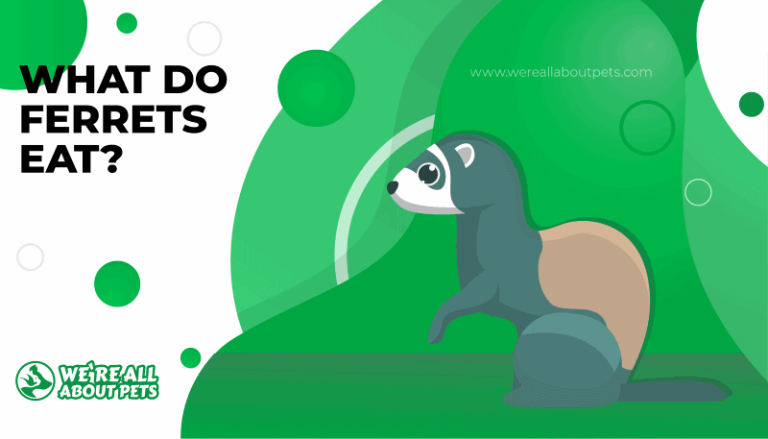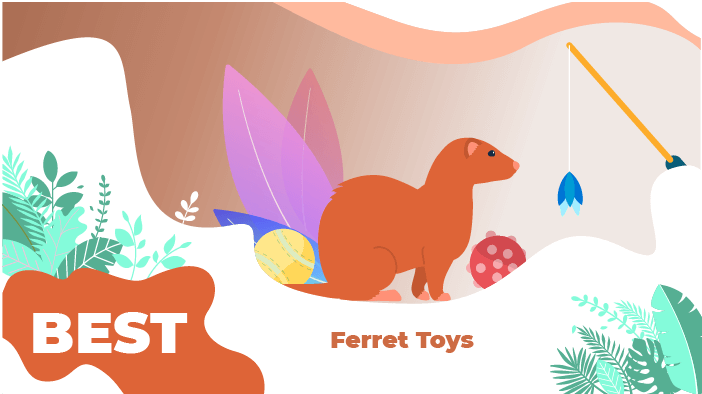How To Care For A Ferret?
This page contains affiliate links. We may earn money or products from the companies mentioned in this post through our independently chosen links, which earn us a commission. Learn More
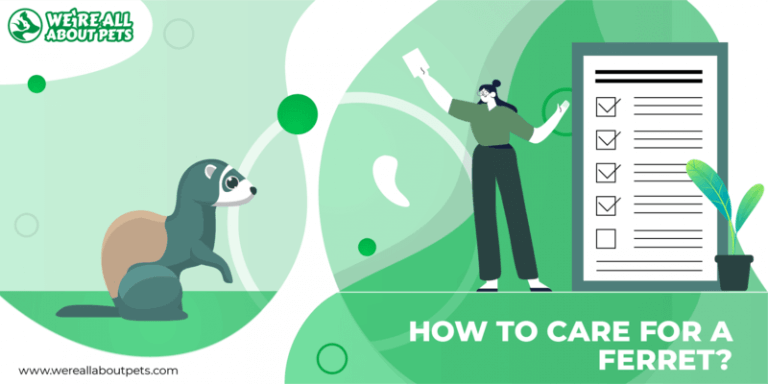
General Stats:
- Pet Type: Small animal
- Size: 13 to 16 inches
- Diet: Carnivorous
- Lifespan: 8 to 11 years
When it comes to pets that are entertaining and full of surprises, ferrets are at the top of the list. These playful pets are surprisingly smart and curious to a fault which often gets them in trouble.
If you’re looking for a pet that will always keep you on your toes, the ferret is certainly one to consider.
Keep in mind, however, that all pets come with a certain degree of responsibility. Ferrets in particular can be challenging due to their carnivorous dietary requirements and their inquisitive natures.
Here’s what you need to know about caring for a pet ferret.
Habitat Setup For Ferrets
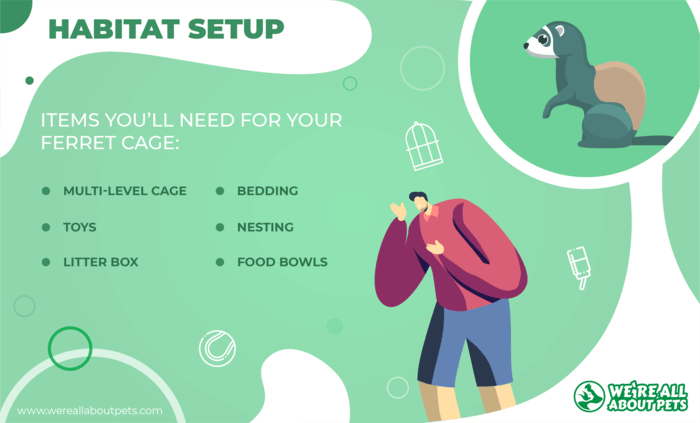
Ferrets are very active animals and they are social animals as well.
This being the case, you need to choose a ferret cage large enough to give your pet space to move around and large enough to accommodate more than one ferret. For two ferrets, you need a cage at least 20x20x40 inches.
Here are some of the items you’ll need for your ferret cage:
- Multi-Level Cage – Most ferret owners prefer wire ferret cages with multiple levels so their ferret can climb and play. Make sure any metal or wire cage is made from sturdy materials that will hold up against sharp teeth and claws.
- Toys – Because ferrets are active and curious by nature, they need plenty of toys to keep them mentally stimulated. Choose toys made from non-toxic materials without any small parts that might come off and pose a choking hazard.
- Litter Box – Ferrets like to keep themselves clean and young ferrets are fairly easy to litter train. Keep a litter box in the cage and consider another box outside the cage for when your ferret gets playtime around the house. You’ll need nontoxic litter – never use cat litter for your ferret.
- Food Bowls – Choose food bowls that aren’t easy to tip over and will stand up to some chewing. Heavy ceramic or stainless-steel bowls are good options that are also easy to clean.
- Bedding – Depending what type of ferret cage you choose, you may want to line the bottom with bedding to absorb liquid and to cushion your pet’s feet.
- Nesting – Give your ferret plenty of comfy places to sleep like nest boxes and hammocks.
In addition to setting up your ferret’s cage, there are a few other supplies you should make sure to have on hand. It’s a good idea to keep some ferret shampoo around in case your ferret gets into something he shouldn’t and to keep his skin and coat healthy.
Ferrets have a reputation for being smelly, but it isn’t true of all ferrets.
These animals do have scent glands, but the majority of their odor comes from musk glands in the skin. Having your ferret de-scented may not actually completely remove the odor. You’re better off feeding your pet a healthy diet and bathing him as needed.
Also Read: The Cost Of Owning A Ferret
Ferret Diet
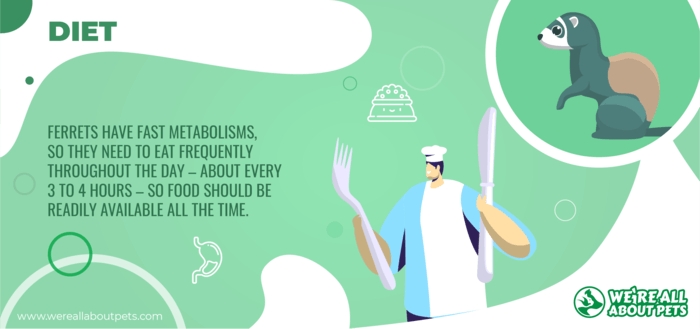
Wild ferrets are obligate carnivores which means they have a biological requirement for a meat-based diet. Their bodies simply aren’t designed to process plant food. Ferrets are members of the weasel family and have short, simple digestive tracts that can process a meal in just 3 to 4 hours.
Here are some quick facts about the ideal ferret diet:
- Ferrets have fast metabolisms, so they need to eat frequently throughout the day – about every 3 to 4 hours – so food should be readily available all the time.
- A commercial ferret food is generally the easiest option for new pet owners to provide – these formulas help ensure complete and balanced nutrition.
- If you choose a fresh food diet, be sure to include a variety of foods like meat, eggs, and fish to ensure nutritional balance and include organ meats and fresh bone in the diet as well.
- Avoid feeding your ferret grains, dairy products, and fresh fruits and vegetables because he won’t be able to digest them properly and they won’t provide as much nutrition as meat.
In addition to healthy ferret food, be sure to provide your pet with unlimited access to fresh water as well.
Ferrets will drink water as much as 20 times a day, so check the bottle often and provide an extra, just in case. Some ferrets drink more from a bowl than they will from a water bottle, but it’s really up to you to decide which option you want to use – you might even do both.
If you do your own research on feeding a ferret, you may come across recommendations to use cat kibble or dog food. While some breeders use wet cat food or kitten food to feed baby ferrets because of the high protein content, it’s always best to use a product specifically formulated for ferrets.
Also Read: What Do Ferrets Eat?
Ferret Veterinary Care
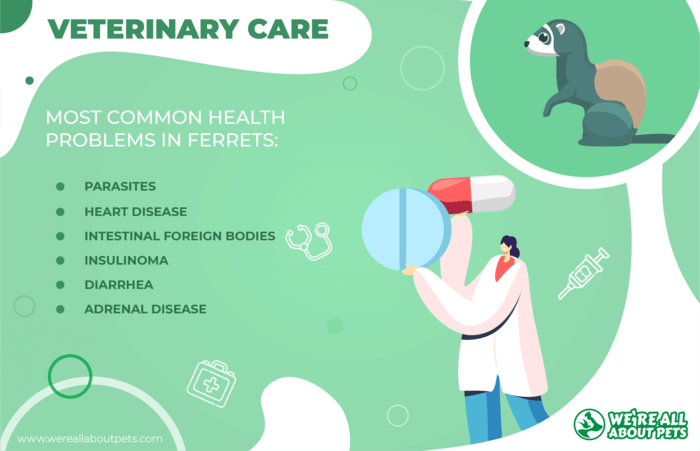
Ferrets are such energetic pets that new ferret owners never suspect that their pet might become ill.
All animals are prone to certain health problems, however, so it’s important to find a vet for your ferret right away and to make sure he gets annual check-ups. You should also familiarize with common signs of illness and the health problems most common in these pets.
Here are some of the most common health problems in ferrets:
- Parasites
- Heart disease
- Intestinal foreign bodies
- Insulinoma
- Diarrhea
- Adrenal disease
Though they are the third most common pet after dogs and cats, ferrets are not an animal many veterinarians are comfortable treating. You may need to find a small animal specialist or an exotics vet.
Ferrets require annual vaccinations for rabies and canine distemper – they are also prone to heartworm. These vaccines shouldn’t be a significant cost each year, but you might consider a pet insurance plan that includes preventive care.
Just remember that you’ll be expected to pay your monthly premium whether you use the plan or not. It may be cheaper to simply save the money in case of emergencies.
Ferret Fun Facts
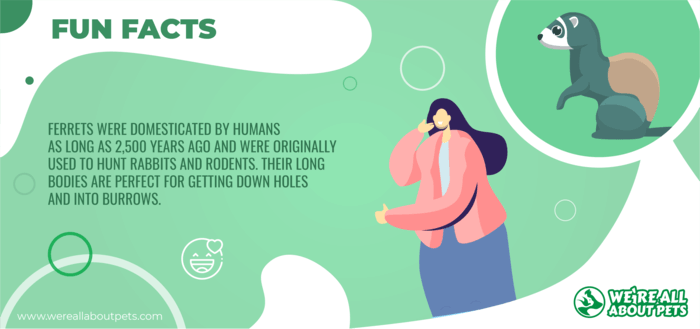
- Ferrets were domesticated by humans as long as 2,500 years ago and were originally used to hunt rabbits and rodents. Their long bodies are perfect for getting down holes and into burrows.
- For years, ferrets were marketed as a low-maintenance alternative to cats and dogs while being a more exciting pet than the guinea pig or hamsters. This led to a huge increase in ferret sales and, unfortunately, to the rise in irresponsible breeding of ferrets.
- Ferrets have specialized teeth as carnivores. They have incisors, canines, premolars, and molars. Young ferrets have 28 to 30 teeth and adult ferrets have 34 permanent teeth.
- The name “ferret” is likely derived from the Latin word “furittus” which means “little thief.” It could be a reference to the ferret’s habit of sneaking and hiding small items.
- Ferrets have extremely high metabolisms and digest food very rapidly. Their hearts beat at an average rate of 200 to 250 beats per minute.
- An intact female ferret is called a jill and a spayed female a sprite. Intact male ferrets are hobs and neutered males are gibs. Baby ferrets are called kits.
- Ferrets have an average gestation period of about 42 days. The average litter has between 3 and 7 kits which are born with all-white fur and don’t develop color until about 3 weeks of age.
If you’re looking for a low maintenance pet, the ferret is not for you. However, if you’re considering an exotic pet and you’re willing to commit a significant amount of time and effort, the ferret might be one to consider.
Keep in mind conservation concerns when it comes to keeping exotic pets and make sure it is legal to do so in your area.
Frequently Asked Questions
How long do ferrets live?
The average lifespan for a pet ferret is about 8 to 11 years. Making sure your ferret has a healthy diet is the best way to maximize his lifespan.
How much do ferrets cost?
The cost to purchase a ferret is generally between $75 and $300. You may pay more if you purchase from a pet store and you also run the risk of getting a ferret that hasn’t been responsibly bred. In addition to purchasing your ferret, you’ll need to provide a cage with all the necessary supplies as well as food, bedding, and veterinary care. Setup costs for ferrets range from $400 to $900 which includes the cost of de-scenting surgery as well as neutering males and spaying female ferrets.
How big do ferrets get?
The average adult ferret grows 13 to 16 inches long and weighs up to 3 ½ pounds.
What do ferrets eat?
Wild ferrets are carnivores but, more specifically, obligate carnivores. Ferrets typically consume whole prey, which means they eat the meat as well as the organs, bone, and skin. Pet ferrets are certainly able to follow the same diet, but it isn’t always feasible for pet owners. A combination of commercial ferret food with fresh meat and organ meats is acceptable in most cases.
Are ferrets good pets?
Ferrets are good pets for a pet owner who is willing to do the work. These pets are very smart and curious by nature, so they aren’t necessarily a low maintenance pet. Your ferret will need plenty of interaction and play time out of the cage, so be prepared to spend some time ferret-proofing the house. You’ll also need to be prepared to provide for your pet’s carnivorous dietary requirements.
Are ferrets messy?
Though ferrets have a bad reputation for being smelly, they are actually fairly clean animals. As carnivores, however, they have anal glands that secret a species-specific scent. The smell most people associate with ferrets actually comes from musk glands in their skin, however. As long as your ferret is fed a healthy diet and his skin is healthy, odor shouldn’t be a problem. Ferrets can also be litter trained which helps limit the mess.
Where do ferrets come from?
Ferrets are a domesticated form of the European polecat, thought to have been domesticated as long as 2,500 years ago. They look similar to a weasel in their long bodies and have the white-and-black coloration of a skunk.
Do ferrets bite?
Ferrets have small, sharp teeth and they do have a tendency to nip. Play-biting is normal behavior for ferrets, but a real bite is usually the result of fear or mistreatment. Some ferrets will nip to get their owner’s attention or to bed for food.
Do ferrets sleep?
Many people believe the ferret is a nocturnal animal, but these animals are actually crepuscular, active around dusk and dawn. In the home, however, ferrets will easily adjust to your schedule.
How long are ferrets pregnant for?
The average gestation period for a ferret is about 42 days. Ferrets become sexually mature as young as 4 to 8 months, but experts recommend spaying or neutering as young as 6 weeks to prevent unwanted breeding.






